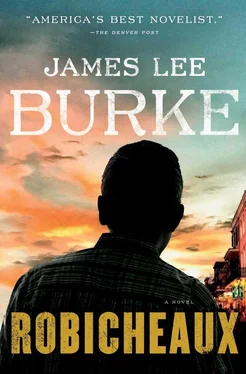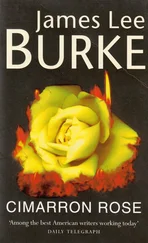I could hear him breathing against the mouthpiece, as though deciding whether or not to hang up. “I don’t care about him.”
“Have you been to Algiers?” I said. “A couple of bad black dudes got their grits splattered over there.”
“What do you know about it?”
“Between you and me, I think they probably had it coming. You hear anything about that?”
“They were bad to a colored lady. Her name was Miss Birdie.”
“Did you smoke these dudes?”
“Maybe,” he said. “If you’re bad or treacherous with me, I’ll smoke you, too.”
“I believe you. But I’d rather be friends with you.”
“I wouldn’t hurt a child,” he said, his voice downshifting.
“I know what you mean. There’s nothing worse than the abuse of children or animals. That’s why Clete takes care of Homer. Clete had a hard upbringing.”
“I’m sorry. Tell him that.”
“Tell Clete?”
“Yes. I didn’t know about the boy.”
“I read you loud and clear, partner. Know anything about Kevin Penny, Smiley?”
“He was a bad man.”
“You didn’t help him do the Big Exit, did you?”
“You’re trying to trick me.”
“Not me. I’m not that smart. You’re like a shadow. You come and go, and nobody has a clue. Who was your artist friend?”
“He was my friend for a while. Then he wasn’t my friend anymore.”
“Could we work out a way to communicate when both of us have more time? I’m pretty tied up right now.”
“I can come by your house.”
He had me. I could almost see him grinning. “You’re calling the shots. Did you ever hear Louie Prima and Sam Butera play at the Dream Room on Bourbon?”
“You want to know how old I am? Remember fifteen years ago when a house was torn down on Calliope and a body fell out of the wall? It had been in there long enough not to smell anymore. This man was bad to somebody who trusted him and got walled up with his paintbrushes stuffed in his mouth. He was a very bad boy. Bye-bye.”
The line went dead. I looked blankly at Helen through the glass. I had witnessed two deaths by electrocution in the Red Hat House at Angola. On both occasions I’d felt that I was watching an element in the human gene pool for which there was no remedy, and I mean the desire to kill, either on the part of individuals or the state. I took a Kleenex from a drawer in my desk and cleared my throat and spat in it, then dropped it into the waste can.
At noon, I took Clete to lunch at Bon Creole out on East St. Peter Street. We ordered fried-oyster po’boys and sat at a table under a blue-and-silver marlin mounted on the wall.
“You couldn’t make the trace?” he said.
“The signal was probably relayed off two or three towers,” I said.
“You checked out the story about the artist in the wall?”
“His name was Pierre Louviere. Evidently, he was an eccentric guy who hung out with a weird crowd in the Quarter.”
“How’d he go out?”
“Not easy.”
“You think Smiley did Penny?”
“No.”
“Why not?”
“He would have said so. He doesn’t have any guilt about the people he kills.”
“Psychopaths lie for the sake of lying,” Clete said.
“He was obviously bothered about putting a bomb in a car that would kill a child.”
The waitress put our food on the table. She looked uncomfortable, obviously having overheard our conversation.
“Don’t pay attention to us,” I said.
She tried to smile but had a hard time with it. She walked away, blinking.
“Go on,” Clete said to me.
“I think Smiley feels he got set up.”
“No idea who he’s working for?”
“None. Sherry Picard called.”
Clete looked at a place six inches from the side of my face. “Yeah?”
“She said y’all aren’t hanging out anymore.”
“It’s more like she flushed me. No big deal.”
Right. I avoided looking at his eyes. He put a cracker into his mouth and chewed. He hadn’t touched his sandwich.
“She’s off the wall, Clete.”
“I’m old, she’s young. You warned me. End of subject.”
“Age is not a factor. She has the grace of a chain saw.”
Wrong choice. Three things about Clete Purcel: Since I’d first met him, he’d never once used God’s name in vain; referred to a woman in a profane way; or criticized a woman who’d dumped him, unless you counted the postcard he sent me from El Sal when he skipped the country on a murder beef and asked me to tell his ex, who’d cheated on him, that he wanted her to have the toothbrush he’d left in the bathroom.
He wadded up a napkin and lobbed it into a trash can by the cold-drink dispenser. “Smiley say anything about Jimmy Nightingale?”
“No. But I had a strange experience with Jimmy at Baron’s Health Club.”
“Like what?”
“I was hitting the speed bag and pretty sweaty and dirty. He squeezed the back of my neck and whispered in my ear. He was standing on my foot.”
Clete’s gaze went away from mine, then came back. “He’s AC/DC?”
“He was talking about making the world into the Garden of Eden.”
“You’re making this up?”
“Jimmy isn’t the same guy I used to know,” I said. “But that’s not what bothers me. I couldn’t scrub his touch off my skin. Helen said the same thing about him.”
Clete looked into space. “I think I’m going back to the Big Sleazy for a few days. Start putting junk in my arm, hanging out at bottomless clubs, go to a Crisco party at a steam room, do something healthy for a change.”
“It’s not funny, Clete.”
“None of this is,” he replied. “I didn’t give you the whole gen on Sherry. She called one of her sniper targets a sand nigger. She tried to take it back, but it made me think about her relationship to Kevin Penny.”
“She might have decided to get rough?”
“Sherry wouldn’t make a good Maryknoll.”
Clete went to Walmart that afternoon. On the way out, he ran into Swede Jensen, the Nightingale chauffeur, whom he’d helped get a job as an extra in Levon’s film adaptation. Swede was wearing white Bermuda shorts with bananas on them and a sleeveless golf shirt, his tan as dark as saddle leather, his armpit hair stiff and bleached by the sun. His concave face always reminded Clete of a hominid replica he had seen in a natural history museum.
“What’s the haps, Swede?” Clete said.
Swede looked around but kept walking.
“Wait up,” Clete said.
“Oh, hey, what say, Purcel?” Swede replied, studying his watch. “How’s it hanging?”
“I saw you on the set behind Albania Plantation. You were wearing a Confederate uniform.”
“Yeah, it’s a lot of fun.”
“They paying you okay?”
“Yeah, union scale, all that stuff.”
Clete waited for Swede to thank him. It didn’t happen. “You don’t have a conflict with your chauffeur job?”
“The Nightingales are flexible. Sorry, I got to boogie.”
“Yeah, the sky’s about to fall. Look at me.”
“Like I said—” Swede began.
“No, you didn’t say anything. Your eyes are going everywhere except my face. In the meantime, you’re blowing me off. It’s called rude.”
“Thanks for what you did. I got a ton of things to do. Nice seeing you.”
Clete stepped in his way. “Don’t talk shit to me, Swede.”
Swede looked like an animal with a limb caught in a trap.
“Did you know fear smells like soiled cat litter?” Clete said.
Swede almost ran through the door.
That weekend, Southern Louisiana was sweltering, thunder cracking as loud as cannons in the night sky; at sunrise, the storm drains clogged with dead beetles that had shells as hard as pecans. It was the kind of weather we associated with hurricanes and tidal surges and winds that ripped tin roofs off houses and bounced them across sugarcane fields like crushed beer cans; it was the kind of weather that gave the lie to the sleepy Southern culture whose normalcy we so fiercely nursed and protected from generation to generation.
Читать дальше












